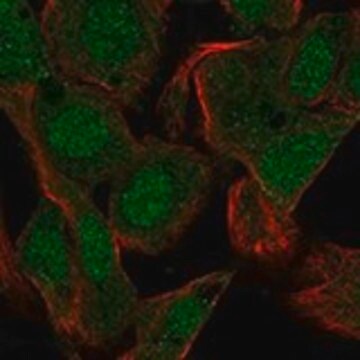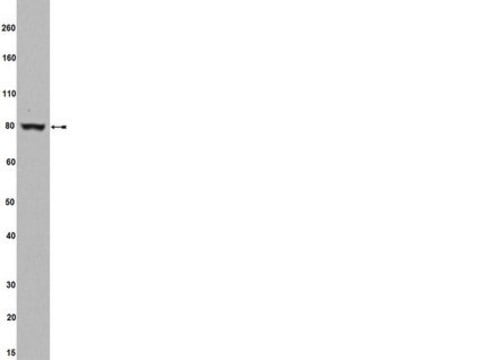MAB1567A4
Anti-MAG Antibody, clone 513, Alexa Fluor™ 488 Conjugate
clone 513, from mouse, ALEXA FLUOR™ 488
Sinónimos:
Myelin-associated glycoprotein, Siglec-4a
About This Item
Productos recomendados
biological source
mouse
Quality Level
conjugate
ALEXA FLUOR™ 488
antibody form
purified antibody
antibody product type
primary antibodies
clone
513, monoclonal
species reactivity
rat, mouse
species reactivity (predicted by homology)
chicken (based on 100% sequence homology), human (based on 100% sequence homology), frog (based on 100% sequence homology), bovine (based on 100% sequence homology)
technique(s)
immunocytochemistry: suitable
immunohistochemistry: suitable
isotype
IgG1
NCBI accession no.
UniProt accession no.
shipped in
wet ice
target post-translational modification
unmodified
Gene Information
human ... MAG(4099)
General description
Immunogen
Application
Neuroscience
Developmental Neuroscience
Quality
Immunohistochemistry Analysis: A 1:100 dilution of this antibody detected MAG in adult mouse brain tissue.
Target description
Physical form
Storage and Stability
Analysis Note
Adult mouse brain tissue
Legal Information
Disclaimer
¿No encuentra el producto adecuado?
Pruebe nuestro Herramienta de selección de productos.
Storage Class
12 - Non Combustible Liquids
wgk_germany
WGK 2
flash_point_f
Not applicable
flash_point_c
Not applicable
Certificados de análisis (COA)
Busque Certificados de análisis (COA) introduciendo el número de lote del producto. Los números de lote se encuentran en la etiqueta del producto después de las palabras «Lot» o «Batch»
¿Ya tiene este producto?
Encuentre la documentación para los productos que ha comprado recientemente en la Biblioteca de documentos.
Nuestro equipo de científicos tiene experiencia en todas las áreas de investigación: Ciencias de la vida, Ciencia de los materiales, Síntesis química, Cromatografía, Analítica y muchas otras.
Póngase en contacto con el Servicio técnico








